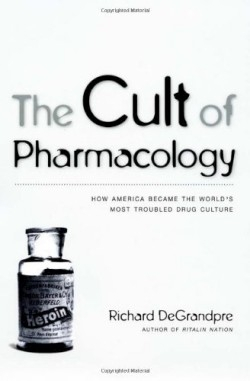The Cult of Pharmacology
How America Became the World's Most Troubled Drug Culture
“All things being equal, Ritalin is nothing less than synthetic cocaine,” writes the author. Yet, this drug has been prescribed in record numbers to America’s youth, and is deemed an acceptable medication. More than one hundred years ago, cocaine, morphine, and marijuana were also accepted in the same fashion, and were readily available for purchase without restrictions.
There was really no market for anti-depressants in the first half of the twentieth century until the drug manufacturers decided to create one. Presently, the U.S. accounts for seventy percent of the anti-depressant market—real or perceived. The anti-depressant phenomenon hit its zenith in the 1980s with the introduction of Prozac.
This book is about the culture of drug evolution. The author shows the use or misuse of drugs to be a function of time, common use, and the power of the pharmaceutical manufacturers. According to DeGrandpre, it’s attitudes and perceptions that ultimately make a drug legal or illegal.
He brings “Big Pharma,” or the large drug manufacturers, into focus for their role in having legislation enacted to create new demands for mood-altering drugs. To illustrate that power, he points out that during the transition from patent medicine to prescription medicine, legislation was enacted in which even alcohol was available only by prescription.
Although DeGrandpre is a psychologist, he attempts to get his message across in a layman’s style. His book is void of diagrams, figures, and illustrations. However, he does bolster his thesis with extensive notes and references drawn from both the technical and news sectors.
The author seeks to illuminate the dark and secret kingdom of the drug manufacturers and their unwitting accomplices—the policymakers and the medical community. One of his passages points out that although medicines are “regulated,” two other forms of drugs—nicotine and alcohol—are not. DeGrandpre devotes one of his nine chapters to describing how the smoking industry also attempts to manipulate their product and the public so that the industry will have a sustained, addictive, and legal market.
Although The Cult of Pharmacology should be required reading for policymakers, it is intended for general use. Anyone who takes a prescription medication, especially a mood or sleeping pill or a painkiller, is a prime candidate to becoming a drug addict. That is the power of prescription drugs, and one that too few recognize until it’s too late.
The author is tenacious in exposing those who he feels are responsible for the present crisis in legal and illegal drug use in America. He also dispels the notion that drugs are “stand-alone chemical agents” either inciting or depressing a “happy center” in the brain. He concludes by reiterating his claim that drug dependence is a combination of what he terms “ecological factors.”
Disclosure: This article is not an endorsement, but a review. The publisher of this book provided free copies of the book to have their book reviewed by a professional reviewer. No fee was paid by the publisher for this review. Foreword Reviews only recommends books that we love. Foreword Magazine, Inc. is disclosing this in accordance with the Federal Trade Commission’s 16 CFR, Part 255.

